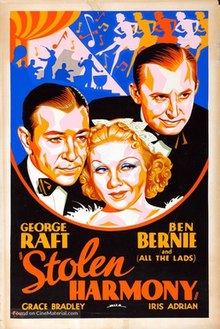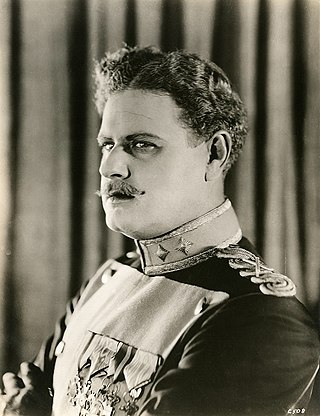
Alan Hale Sr. was an American actor and director. He is best remembered for his many character roles, in particular as a frequent sidekick of Errol Flynn, as well as films supporting Lon Chaney, Wallace Beery, Douglas Fairbanks, James Cagney, Clark Gable, Cary Grant, Humphrey Bogart, and Ronald Reagan. Hale was usually billed as Alan Hale and his career in film lasted 40 years. His son, Alan Hale Jr., also became an actor and remains most famous for playing "the Skipper" on the television series Gilligan's Island.

Raoul Walsh was an American film director, actor, founding member of the Academy of Motion Picture Arts and Sciences (AMPAS), and the brother of silent screen actor George Walsh. He was known for portraying John Wilkes Booth in the silent film The Birth of a Nation (1915) and for directing such films as the widescreen epic The Big Trail (1930) starring John Wayne in his first leading role, The Roaring Twenties starring James Cagney and Humphrey Bogart, High Sierra (1941) starring Ida Lupino and Humphrey Bogart, and White Heat (1949) starring James Cagney and Edmond O'Brien. He directed his last film in 1964. His work has been noted as influences on directors such as Rainer Werner Fassbinder, Jack Hill, and Martin Scorsese.

Jerome Irving Wald was an American screenwriter and a producer of films and radio programs.

George Raft was an American film actor and dancer identified with portrayals of gangsters in crime melodramas of the 1930s and 1940s. A stylish leading man in dozens of movies, Raft is remembered for his gangster roles in Quick Millions (1931) with Spencer Tracy, Scarface (1932) with Paul Muni, Each Dawn I Die (1939) with James Cagney, Invisible Stripes (1939) with Humphrey Bogart, and Billy Wilder's comedy Some Like It Hot (1959) with Marilyn Monroe and Jack Lemmon; and as a dancer in Bolero (1934) with Carole Lombard and a truck driver in They Drive by Night (1940) with Ann Sheridan, Ida Lupino and Bogart.

George Francis "Gabby" Hayes was an American actor. He began as something of a leading man and a character player, but he was best known for his numerous appearances in B-Western film series as the bewhiskered, cantankerous, but ever-loyal and brave comic sidekick of the cowboy stars William Boyd, Roy Rogers and John Wayne.

Edward Joel Pawley was an American actor of radio, films and Broadway. The full name on his birth certificate is Edward Joel Stone Pawley; he never used the Stone name, which derived from a Stone family in Illinois.

Mae Clarke was an American actress. She is widely remembered for playing Henry Frankenstein's bride Elizabeth, who is chased by Boris Karloff in Frankenstein, and for being on the receiving end of James Cagney's halved grapefruit in The Public Enemy. Both films were released in 1931.

Benjamin Anzelevitz, known professionally as Ben Bernie, was an American jazz violinist, bandleader, and radio personality, often introduced as "The Old Maestro". He was noted for his showmanship and memorable bits of snappy dialogue, being part of the first generation of "stars" of American popular music, alongside other artists such as Paul Whiteman, Ted Lewis and Al Jolson.
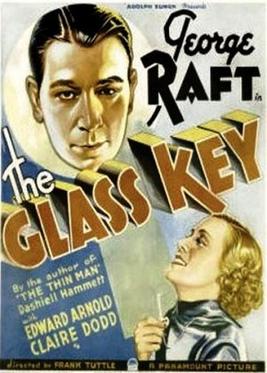
The Glass Key is a 1935 American crime drama film directed by Frank Tuttle starring George Raft, Edward Arnold, Claire Dodd, Guinn "Big Boy" Williams and Ray Milland. Ann Sheridan has a brief speaking role as Raft's character's nurse in their first film together. Produced and distributed by Paramount Pictures, it was based upon the 1931 suspense novel The Glass Key by Dashiell Hammett,
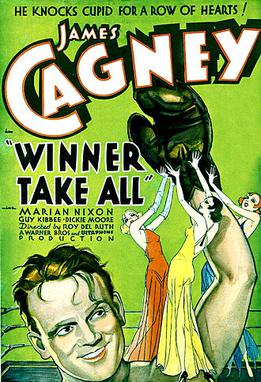
Winner Take All is a 1932 American pre-Code drama film directed by Roy Del Ruth and starring James Cagney as a boxer. The film also features a single scene of George Raft conducting a band that had been lifted from Queen of the Night Clubs, an earlier film and lost film. Cagney and Raft would not make a full-fledged film together until Each Dawn I Die seven years later.

Taxi! is a 1932 American pre-Code film directed by Roy Del Ruth and starring James Cagney and Loretta Young.

Rumba is a 1935 American musical drama film starring George Raft as a Cuban dancer and Carole Lombard as a Manhattan socialite. The movie was directed by Marion Gering and is considered an unsuccessful follow-up to Raft and Lombard's smash hit Bolero the previous year.

City for Conquest is a 1940 American epic drama film directed by Anatole Litvak and starring James Cagney, Ann Sheridan and Arthur Kennedy. The picture is based on the 1936 novel of the same name by Aben Kandel. The supporting cast features Elia Kazan, Anthony Quinn, Donald Crisp, Frank McHugh, Frank Craven and Lee Patrick.
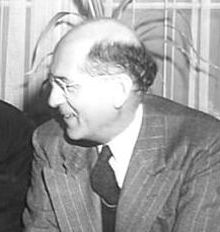
Albert E. Lewis was a Polish-born Broadway and film producer. His family emigrated to the Lower East Side of Manhattan, New York when he was a boy. He became a vaudeville comedian, then started a partnership producing one-act plays for vaudeville. Around 1930 he moved to Hollywood and worked as a film producer with Paramount, RKO, and MGM until after World War II.

Jack La Rue was an American film and stage actor.
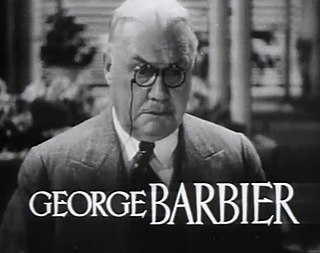
George W. Barbier was an American stage and film actor who appeared in 88 films.
Charles Farrell was an Irish stage, film and television actor.

Grace Bradley was an American film actress who was active in Hollywood during the 1930s.

Noel Francis was an American actress of the stage and screen during the 1920s and 1930s. Born in Texas, she began her acting career on the Broadway stage in the mid-1920s, before moving to Hollywood at the beginning of the sound film era.

Adrian Michael Morris was an American actor of stage and film, and a younger brother of Chester Morris.
